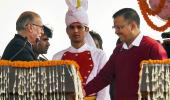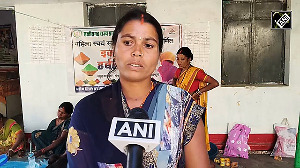With the total number of municipal wards set to be revised following the passage of the Delhi Municipal Corporation (Amendment) Bill-2022 in Rajya Sabha on Tuesday, experts have said that the civic polls in New Delhi is unlikely to take place before a year from now as a fresh delimitation exercise will be required.

A unified civic body will be 'good for Delhi' and 'good for people', serving and former mayors of the city said.
They, however, underlined that civic polls were not likely to take place before one year due to a fresh delimitation exercise.
According to the Delhi Municipal Corporation (Amendment) Bill-2022, passed by Lok Sabha last week, the unification of the municipal corporations will ensure synergised and strategic planning and optimal utilisation of resources.
The Rajya Sabha gave its nod through a voice vote after negating all amendments sought by the opposition.
South Delhi Mayor Mukesh Suryan welcomed the passage of the Delhi Municipal Corporation (Amendment) Bill, saying, 'a unified civic body will be good for Delhi, good for people, good for civic administration as well as good for employees'.
Asked how soon the civic polls might be conducted, he said, "I cannot comment on it specifically, but the delimitation exercise will take time, a year or so".
However, he exuded confidence that the Bharatiya Janata Party, the ruling party in all three corporations, will 'emerge victorious, whenever the polls will be held'.
He said in the last delimitation exercise in 2007, the number of wards had changed from 134 to 272 and it had taken about a year's time.
Former mayors of North Delhi and South Delhi also echoed Suryan.
The Municipal Corporation of Delhi (MCD) had come into being in 1958 after the passage of the Delhi Municipal Corporation (DMC) Act by Parliament in 1957.
It was trifurcated in 2012 into North, South and East corporations.
Sources at the State Election Commission in New Delhi had earlier said that after passing of the bill to reunify the three civic bodies in the city, civic elections are likely to be delayed by around a year.
The polls were earlier slated to be held in April.
Since the bill talks about capping the number of wards to 250, the Centre will form a delimitation commission after the bill is passed by both the Houses of Parliament, they said.
The delimitation commission will then start the exercise to reorganise municipal wards in accordance with the population in respective Assembly segments.
"The delimitation exercise alone will take around 6-7 months. After the delimitation exercise is completed, its report has to be notified by the Centre and then the process of rotation of wards, and other poll exercises will be started. So overall it is likely to take a year to conduct municipal elections in Delhi," a source said.
Sources also added the reduction in number of wards in the proposed unified municipal body is also likely to affect the composition of several assembly constituencies in Delhi.
Delhi presently has 70 assembly seats.
Currently, the three corporations in Delhi -- North Delhi Municipal Corporation (NDMC), South Delhi Municipal Corporation (SDMC) and East Delhi Municipal Corporation (EDMC) -- have 272 wards.
While the North and South corporations have 104 wards each, the East corporation has 64.
The number of seats in the merged municipal corporation of Delhi will not exceed 250, and a special officer may be appointed to oversee its function till the first meeting of the body is held under the reunification law, according to the bill.
Constitutional expert and former secretary, Delhi assembly, S K Sharma, had earlier said if the number of wards were reduced from the current 272, then it would require a delimitation exercise, which will take a 'very long time'.
"The administrative process for delimitation will take several months, and then public suggestions and objections will be elicited, and so, the civic polls are not likely to take place in the next five to six months. It may even get further delayed," he had said.
The bill states that the 2011 trifurcation of the erstwhile Municipal Corporation of Delhi (MCD) was 'uneven' in terms of territorial divisions and revenue generating potential.











 © 2025
© 2025